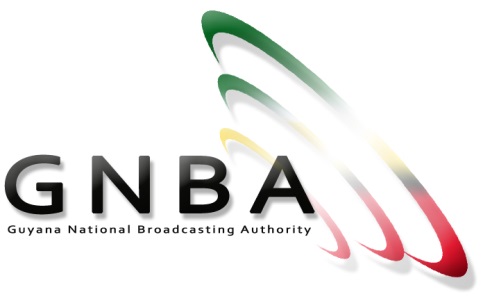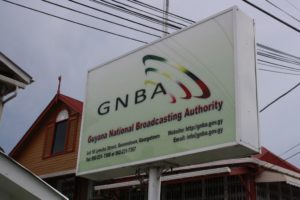Indigenous broadcaster speaks about her career
By Wendella Davidson
MICHELLA ABRAHAM-ALI, who holds the position of Regional Radio Manager and Production Manager, Radio at the National Communications Network (NCN), views the establishing of radio stations in the hinterland as a “big deal”, as it seek to inject new life to the residents of those areas.
Originally from Nappi Village, located at the foot of the Kanuku Mountains in Central Rupununi, and the home village of the first balata craftsman, George Tancredo, and where the world’s largest bird of prey –the Harpy Eagle – can be found, the broadcaster, who has already chalked up 16 years of service, said she at one time wanted `to throw in the towel’ on her career, but had a change of heart with the opportunities that have opened up for persons with the same mindset as hers.
“I was ready for retirement but when regional radio came, I got a new lease on life, as I can help to spot and nurture new talents in persons like myself,” she told the Guyana Chronicle during an exclusive interview, on Tuesday.
Abraham-Ali’s dad Michael Abraham, AA, an Arawak, died 18 weeks ago. He was originally from Moruca- a community in the North West District and married, Eleanor, who is of East Indian ancestry and hailed from Corriverton, on the Corentyne. Her parents were both teachers in college when they met and subsequently moved to the Nappi Village, where they both continued their teaching career at the primary school. While her mom retired as a head-teacher, her dad, who also held the position as headmaster, became engrossed in politics.
The closely-knit Roman Catholic family that included three boys and five girls enjoyed outdoor fun, swimming and a limited amount of farming.
According to the broadcaster, she was schooled at Nappi Primary, where upon writing the then Common Entrance Examination, she was awarded a government scholarship to attend the Saint Stanislaus College in the city. She spent five years at the school, wrote the Caribbean Examination Council (CXC) examination, and then went over to St Joseph’s High where she wrote the Caribbean Advanced Proficiency Examination (CAPE).
It was in 2000, while contemplating the next move after the examination, Abraham-Ali said her attention was drawn to a Guyana Broadcasting Corporation (GBC) audition call for interested persons to try out to become broadcasters. She recalled feeling a bit intimidated, when as a frail-looking girl, she turned up at the GBC High Street location, to find about 300 people waiting in the lobby to be auditioned. She said she drew courage and confidence from the fact that she had gained some exposure while volunteering, just after leaving school, with the Catholic Standard.
The Catholic Standard is a weekly newspaper of the Roman Catholic Diocese of Georgetown, and the only religious newspaper in Guyana. However, while she tried her hand at writing, her niche was for the creative process of being on radio. Abraham-Ali related that when she received a notice from the GBC to attend a second audition that had 20 people only, she surmised that she must have been doing something right. Subsequently, she got a third call and was surprised to find that there were only five others.
RECRUITED FROM AUDITION
All six persons present at the final audition were eventually selected to join the corporation as trainee announcers, which was basically the start of Abraham-Ali’s career with radio. She fondly remembered it was the then General Manager, Fazil Azeez, who handed her the `Letter of Employment’.
Abraham-Ali reasoned that the pull factor during the final audition that probably determined her being qualified for the job, may have been an `ad lib’ on a topic of interest and she speaking on ‘Growing up in the Rupununi’. “When I was selected I was surprised and excited, also definitely intimidated, as the GBC had a standard. I was just about 17 years old and sitting daily in a newsroom while observing popular broadcasters in the likes of Fazil Azeez, Margaret Lawrence, Phyllis Jackson, Rovin Deodat, Ron Robinson, Ulita Anthony, Sydney James, Matthew Allen, and Pancho Carew, who I briefly worked with operate with utter professionalism was and is still memorable.”
“It is an honour at this point in my career, to still be working with Rovin Deodat, Margaret Lawrence, Phyllis Jackson and Ron Robinson, those who, when I started [working] were my bosses, we now work as colleagues at NCN (National Communications Network),” she added.
Abraham-Ali pointed out that her training as a broadcaster entailed interviewing, broadcasting, news presentation, outside broadcast and all the elements that make broadcasting what is, along with doing attachments in all sections of the corporation, including finance. “It was a three-month learning curve and I was full of zeal and confidence, I was open-minded, I wanted to go on everything (assignment) they were sending me, and was happy when one of my seniors couldn’t be on the job as I was able to get into that hot seat,” she added.
According to her, “being an Indigenous person helped, as I was able to, along with Merano Issacs and Debra Francis – some of the other Indigenous broadcasters who were in radio at the time – to bring that part of our society to the people.” “We used our shifts, our spaces, our slots and individual experiences to bring the hinterland to the people. My limited experience was at Central Rupununi but that alone was appealing, as people got to know about the Kanuku mountains, the savannahs, about fishing and farming, the rainforest, the fruits and the way of life of the Indigenous peoples through the programming … at that time, the reach of radio is not as it is now, there are three radio stations sited in the Rupununi,” she said.
MAKING COMMUNITY PROUD
Continuing, Abraham-Ali said she tried her utmost to make her community and family proud of her, but noted that on her sixth month of working, her enthusiasm was deflated with a damming `Letter to the Editor’ that was very critical of her work. Recalling the particular event, she said while she is sure she cried when the article was brought to her attention, so critical was it, that the now 16-year veteran broadcaster remarked that while she was hurt, it did not break her, it taught her instead – among other things – to always double-check information before sharing.
YOU HAVE TO BE TOUGH
”You have to be tough in this industry, there are people who will not approve of what you are doing, even now there are people who do not appreciate what I do, they say I am over-emphasising about the Indigenous People, but my aim is to showcase and get all of Guyana to appreciate our Indigenous People and what they do, just as we do with all of Guyana.” she added.
In a quest to further her studies, Abraham-Ali was awarded a scholarship from the Public Service Ministry (PSM) to pursue a Diploma in Communication at the University of Guyana. She recalled lending some assistance to have the communications curriculum modified. Married in 2003, Abraham-Ali remembered being heavily pregnant when she wrote the final examination at the university to obtain her degree. It was just three days after that she gave birth to her first child, a girl, whom she named Tatyana.
Abraham-Ali, who has chalked up 16 years in the profession, has over the period been exposed to both local and international training, in addition to having a wide range of coverage of state visits, pageants, elections, fires, prison breaks. She had her first break at emceeing in 2016 at a Guyana Folk Festival function in New York and at a similar event in Canada in 2018. Although she now functions mostly in the capacity of an administrator, she said with her experience, particularly in the capacity as Regional Radio Manager, her goal is to give back to her country and its people, more importantly to those in hinterland.
“Going back to my home village and other interior and hinterland regions, and through radio, give of my skills and talent to help build capacity, and bring out the talent and skill in persons who may eventually exceed what I have done as a broadcaster, to have the same platform to become better. It is a pleasure finding the talents and the people who share the same curiosity as I did, nurture them and help them on their journey to become radio announcers as well, she added. A part-time lecturer at the University of Guyana, she also serves on the Board of Directors of President’s College, with special interest in the welfare of hinterland students who are resident there.
Source: Guyana Chronicle



